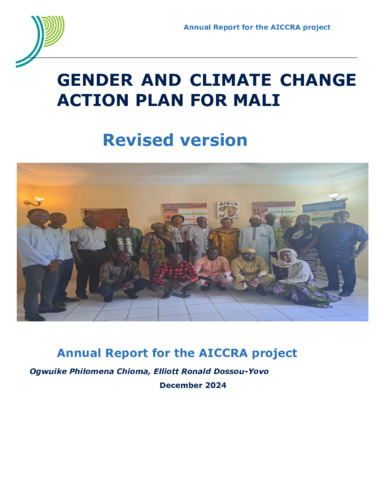Gender and Climate change Action Plan for Mali
Abstract
"Mali is a landlocked, Sahelian country in West Africa. The Climate Change Vulnerability Index produced by ND-GAIN in 2023 ranked Mali as 176th of the 181 most at-risk countries in the world1. It is the 9th most vulnerable country and the 43rd least ready country to address climate change effects. Mali is ranked 155th out of the 170 countries included in the 2021 UNDP Gender Inequality Index (UNDP,2021). Mali is home to the inner delta of the Niger River that runs through nine countries in the region. The country is influenced by the Inter-Tropical Conversion Zone (ITCZ) which is, creating winds from Ocean and the winds from the Sahara region that are more dusty and warmer. The country is already experiencing the climate change impacts of droughts, floods, storms, strong winds, and increased temperature variability. These events can have a devastating impact on crop yields, livestock production, and food security. Available evidence indicates that climate change in Mali is likely to be characterized by increased local temperatures, greater rainfall variability, and more intense extreme weather events. Gender dynamics are integral to the climate change discourse in Mali, as men, women, and youth play distinctly disproportionate roles in agriculture. They also face varying degrees of challenges in accessing critical production resources such as land, water, and credit. Women, who constitute over 50% of the agricultural labor force, are primarily responsible for food production. However, gender inequality persists despite previous global, regional, and national commitments to uphold and advance women’s rights.
This Action Plan seeks to address the gender dimensions of climate change within the agricultural sector and is centered around four key objectives, including:
(i) increase women and youth's access to land, water, and credit.
(ii) improve knowledge and skills of the various gender groups (women, men, and youths) in climate change adaptation with a determined effort to narrow down existing gender gaps among the groups.
(iii) strengthen women's participation in decision-making and policymaking related to climate change.
(iv) promote the use of gender-sensitive indicators to monitor and evaluate the climate change related programs.
The plan is expected to have several benefits, including:
I. increased food security and nutrition for women and their families.
II. improved livelihoods for men, women, and youths.
III. increased resilience to climate change.
IV. increased gender equality in the agricultural sector.
The gender and climate change action plan is expected to be implemented by government agencies, non-governmental organizations, and development partners.
Key Messages of the gender and climate change action plan
i) It underscores the centrality of climate change in the core of agricultural development discourse emphasizing that climate change is a major threat to the agricultural sector in Mali.
ii) It highlights the indispensability of women’s role who contribute disproportionately to agriculture in Mali.
iii) The CCGAP for Mali is designed to address the gender dimensions of climate change within the agricultural sector, and
iv) It aims to effectively communicate the principles and goals required to mainstream gender into climate change strategies and foster sustainable and inclusive outcomes.
The following recommendations, derived from the CCGAP intends to ensure an adequate gender mainstreaming into climate change action and mitigation programs of the agricultural sector and are summarized below.
• Strengthen Institutional Support: Enhance coordination between governmental agencies, NGOs, and development partners to ensure effective implementation of the CCGAP. Establish dedicated gender units within relevant institutions to monitor progress.
• Promote Inclusive Policies: Advocate for legal reforms to ensure women’s equitable access to land, water, and credit. Integrate gender-sensitive indicators in national policies and programs.
• Capacity Building: Provide targeted training on climate-smart agriculture and resource management for women and youth, ensuring equitable access to extension services and information.
• Community Engagement: Organize regular farmers’ field days and participatory workshops to raise awareness and share best practices in gender-responsive climate action.
• Leverage Financial Mechanisms: Mobilize funding from climate finance initiatives to support gender-inclusive adaptation projects, ensuring resources reach the most vulnerable groups.
• Monitor and Evaluate Progress: Develop robust gender-sensitive monitoring frameworks to evaluate the outcomes of the CCGAP, with periodic assessments to inform policy adjustments."

